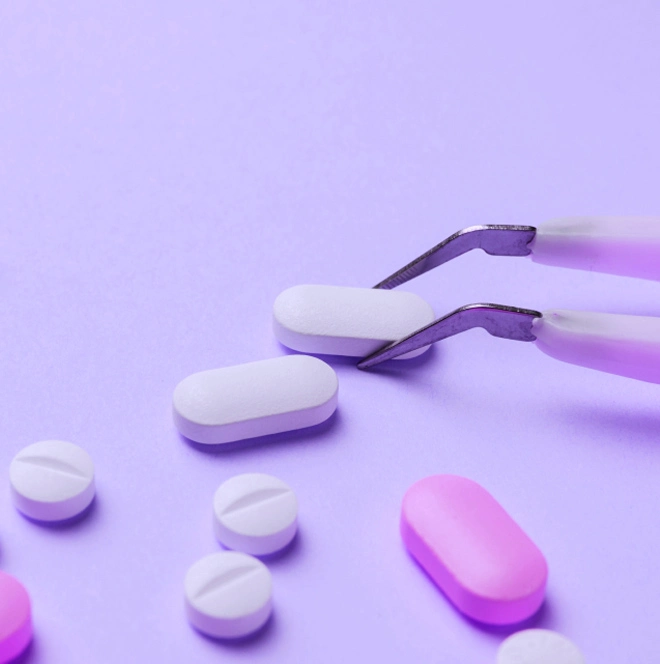
Perimenopause is the phase that leads up to menopause, typically starts in your late 30s and early 40s, and can last up to 10 years. While perimenopause is a natural biological process, it can present very different symptoms for each woman. Menopause and fatigue are a very common combination. With perimenopause, there are many physical symptoms such as hot flashes, emotional changes, weight gain, brain fog, low energy, and extreme tiredness. Fatigue is a common symptom of perimenopause which can range from mild to severe, and can be one of the most difficult perimenopause symptoms to manage.
In this article, we will look at menopause fatigue in more detail. Its causes, signs and symptoms, and treatments that may help including natural menopause treatments.
Prescription menopause relief. Delivered.

What Does Menopause Fatigue Look Like?
At various times in our lives, all of us can feel overtired or overworked, but typically we can find ways to take care of ourselves and recover. With perimenopause, the unrelenting exhaustion can last for months if not years, is more severe, and is not simply cured with rest.
If you have chronic fatigue you may wake in the morning feeling as though you've not slept. Or maybe you are unable to function at work, or aren’t as productive at home and with your family as you’d like. You may be too exhausted to even manage basic activities. Menopausal fatigue often includes having a constant sense of being drained, feelings of zero energy and/or motivation, and can diminish your overall quality of life. 1,2 Women with menopausal fatigue can be tired and anxiety-ridden leading to:
Poor sleep.
Feeling tired and fatigued daily.
More difficulty thinking, concentrating, remembering, or making decisions.
Difficulty waking up in the morning.
Less able to handle stress.
Craving salty food or sweets.
Higher levels of energy in the evening.
Seeking out too many stimulants, like caffeine beverages.
A weak immune system. 3
So, why do so many women experience symptoms of fatigue and utter exhaustion when going through menopause? There are a multitude of perimenopausal symptoms that can individually lead to fatigue, but in combination, they can lead to an overwhelming state of fatigue. The most obvious perimenopause symptom that can lead to fatigue is the lack of sleep and the constant battle to get consistent quality sleep. If not treated, this can lead to debilitating exhaustion.
What Can Cause Menopausal Fatigue?
As a woman enters perimenopause, her hormone (estrogen, progesterone, and testosterone) levels fluctuate dramatically, which can cause chronically disrupted sleep. Also, lower levels of estrogen and progesterone can make some women short-tempered and less able to relax. So actually getting to sleep, or just taking a moment to unwind, can be difficult.
The decrease in these hormones can lead to throwing off cortisol (the ‘stress’ hormone), and thyroid hormone levels. When you're stressed, you will produce more cortisol leading to a cycle of even more stress. 3With high levels of cortisol and thyroid hormones, and a drop in estrogen, progesterone, and testosterone, can lead to a huge variety of ways that rest is disrupted. Here’s a few of the major ways hormones impacts rest:
Sleep Apnea. Balanced hormones can help protect women from sleep apnea. 1,2 Sleep apnea is a sleep disorder where breathing repeatedly stops and starts.
During menopause, women produce less progesterone and estrogen ultimately putting them more at risk for sleep apnea. 3,4
When you have sleep apnea you actually have oxygen deprivation which may cause you to awaken several times a night.
If the apnea goes untreated, it can cause loud snoring, daytime tiredness, or more serious problems like heart trouble or high blood pressure. 3,4
Symptoms of Sleep Apnea sound like many perimenopause symptoms including: 3,
Snoring
Fatigue or sleepiness during the day
Restlessness while sleeping, or regular nighttime awakenings
Waking up suddenly after gasping or choking
Menopausal Weight Gain. With additional weight, especially in the torso and neck, women can increase the probability of having sleep apnea.
Hot flashes and night sweats are also likely culprits of poor sleep and feelings of fatigue. Hot flashes and night sweats can trigger the body to wake up frequently. Even women who don’t report having sleep disturbances from hot flashes often say that they have more trouble sleeping than they did before menopause.
Elevated levels of cortisol and thyroid hormones. When our bodies produce less estrogen and progesterone it can affect other hormones, such as cortisol and thyroid hormones. 5 These hormones regulate the basic cellular energy in the body. When they are imbalanced, this drop in cellular energy can make you feel fatigued.
Stage of Life. When women are in perimenopause, this is a phase of life when many women in the US are typically at the height of their careers (stressful), their family may be transitioning (empty nesters), they may be caring for both teenagers and parents, and so much more.
Medical Conditions. A wide variety of medical conditions can lead to feelings of chronic fatigue and include:
Allergies, Hay Fever
Anemia
Depression, Anxiety
Fibromyalgia
Food Allergies, Food Intolerance
Heart Disease
Other Sleep Disorders
Diabetes
Underactive Thyroid (Hypothyroidism) (Hashimoto's thyroiditis)
Cancer-Related energy imbalances
Menopause Fatigue Treatment
The main medical treatment for the symptoms of menopause is hormone replacement therapy (HRT). 5 HRT works by replacing lost hormones, which can improve fatigue. By allowing you to finally sleep again, or maybe help you to lose the menopausal weight and reduce sleep apnea, you can start to feel less fatigued quickly.
Another potential option to reduce fatigue is non-hormonal medication, like antidepressant therapy which includes serotonin reuptake inhibitors (SSRIs) or selective norepinephrine reuptake inhibitors (SNRIs). These drugs may improve hot flashes and night sweats, which can improve sleep, but for some people, SSRIs and SNRIs can cause insomnia rather than make it better.
Lifestyle changes can also help improve menopausal fatigue.
It’s helpful to try incorporating lifestyle changes to start improving your sleep and feelings of fatigue.
Exercise. It may be difficult during these phases of fatigue to get up and exercise, but studies suggest it can improve energy levels overall in people going through menopause. Moderate-to-vigorous physical activity can help you feel more energetic. 5
Avoid stimulants and alcohol. Caffeine can feel like such a simple solution when energy levels are low, but too much caffeine can disrupt sleep and leave you feeling even more tired. Alcohol can help people feel drowsy when they are having difficulty sleeping, but it lowers sleep quality overall and can also be a hot flash trigger. 5
Avoid eating spicy food. Spicy food is notorious for triggering hot flashes — avoid it if you can.
Bedtime routine. Devise a regular schedule for sleep to ensure you are getting enough sleep - including:
Going to bed and waking up at the same time every day
Avoiding naps in the daytime
Refrain from using computer screens and electronic devices before bed
Drinking warm drinks, or taking warm baths or showers, in the evening
Use the bedroom for sleep or sex only
Meditation, yoga, and Tai Chi can provide gentle exercise and also lower stress, and both may help with energy levels and sleep.
Prescription menopause relief. Delivered.

Conclusion
Most of us know what it's like to be tired, especially when we have a cold, the flu, or up with a colicky baby. But when you have a constant lack of energy and ongoing fatigue, it may be time to check with a Winona doctor.
It is important to speak with a doctor about unexplained fatigue, as well as any other symptoms that may be menopause-related. They can confirm if you are entering menopause, and rule out more serious conditions. Menopause is a completely natural and normal part of getting older, but that doesn’t mean you have to suffer in silence. A Winona doctor can help you manage your symptoms and determine which treatments can make you more comfortable. Hormone therapy is available in oral tablets, or as topical cream or patches. Check out bywinona.com today! References



